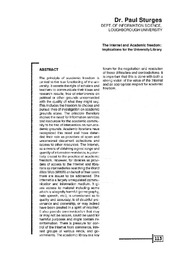| dc.contributor.author | Sturges, Paul | en |
| dc.coverage.spatial | GR - Ρόδος | en |
| dc.date.available | 2005-10-12T12:00:00Z | el_GR |
| dc.date.issued | 1999 | el_GR |
| dc.identifier.uri | http://hdl.handle.net/10797/12065 | en |
| dc.description | Περιέχει το πλήρες κείμενο | el_GR |
| dc.description.abstract | The principle of academic freedom is central to the true functioning of the university, It asserts the right of scholars and teachers to communicate their ideas and research results, free of interference on political or other grounds unconnected with the quality of what they might say. This includes the freedom to choose and pursue iines of investigation on academic grounds alone. The principle therefore implies the need for information services and resources for the academic community to be free of intervention on non-academic grounds. Academic librarians have recognized this need and have defended their role as providers of open and uncensored document collections and access to other resources. The internet, as a means of obtaining a great range and quantity of information worldwide, is potentially crucial to the practice of academic freedom. However» for libraries as providers of access to the Internet and librarians as intermediaries searching the World Wide Web (WWW) on behalf of their users there are issues to be addressed. The Internet is a largely unregulated communication and information medium. It gives access to material including some which is allegedly harmful (pornography, hate speech, etc.), is unendorsed as to quality and accuracy, is of doubtful provenance and ownership, or may indeed have been created in a spirit of mischief. It also permits communication that may or may not be secure, could be used for harmful purposes and might contain misinformation. There is pressure for control of the Internet from commerce, interest groups of various kinds, and governments. The academic library is a key forum for the negotiation and resolution of these difficulties and contradictions. It is important that this is done with both a strong vision of the value of the internet and an appropriate respect for academic freedom. | en |
| dc.language.iso | gre | en |
| dc.publisher | Βιβλιοθήκη Πανεπιστημίου Αιγαίου | el_GR |
| dc.relation.ispartof | Η Ακαδημαϊκή Βιβλιοθήκη ως εκπαιδευτική και ερευνητική μονάδα. | el_GR |
| dc.source | Η Ακαδημαϊκή Βιβλιοθήκη ως εκπαιδευτική και ερευνητική μονάδα στην 3η χιλιετία - 8ο Πανελλήνιο Συνέδριο Ακαδημαϊκών Βιβλιοθηκών | el_GR |
| dc.source.uri | http://abekt.lib.ucy.ac.cy/synedria/8psab/8psab015.pdf | en |
| dc.title | The internet and Academic freedom: implications for the University library | en |
| dc.type | Conference Object | en |
| dc.subject.JITA | Τεχνολογίες πληροφόρησης και τεχνολογίες βιβλιοθηκών, Διαδίκτυο, συμπεριλαμβανομένου του παγκόσμιου ιστού | el_GR |
| dc.subject.JITA | Information technology and library technology, Internet, including WWW | en |
| dc.contributor.conferenceorganizer | Πανελλήνιο Συνέδριο Ακαδημαϊκών Βιβλιοθηκών | el_GR |
| dc.identifier.JITA | LC | en |
